By V. Jolene Miller
As writers, we give poignant thoughts, an opportunity to escape, to relax, to travel abroad while sitting still. In the process, we take a little too. Meet five emerging independent authors of short story collections and discover what they’re taking from those who allow their stories to swallow them whole.
Clarissa Gosling: Author of Moving Abroad with Children, Raising Bilingual Children: when school speaks a different language, and A Mixed Bag: a multi-genre collection of short stories.
Tara Wine-Queen: Author of Tenderness and Troubling Times
Leslie Sullivan (aka Anna McCluskey): Author of A Pilsner Colored Ring of Light
Divya Adu: Author of You Are Enough, Said Me and room 317
Remi Carrington: Author of the Bluebonnets & Billionaire series
Clarissa Gosling
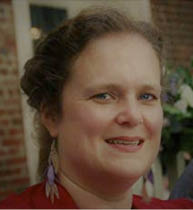
Clarissa Gosling is the author of A Mixed Bag, a multi-genre collection of short stories. She hails from the Netherlands where she started her writing career in the non-fiction realm. After a year of writing exploration and trying out a variety of genres, Gosling independently published four of the stories in A Mixed Bag. When she’d finished writing six additional stories, she bundled the ten of them together and published the full collection.
Although Gosling’s previously published works were centered on non-fiction topics, she received only positive feedback when she shared with her immediate entourage that she was itching to write and publish a collection of stories. “I didn’t receive any negative reactions. Most people were interested and supportive of me. I think the idea that I was writing and publishing a book was more important.”
A Mixed Bag contains no overarching theme but does consist of a variety of cross-genre selections that might appeal to any number of readers. Gosling explains, “there’s a fairytale, a techno-thriller, a historical fantasy, a sci-fi story, a paranormal romance, a couple of middle-grade ghost stories, two contemporary family dramas, including one with some fairies in it.” Though she admits this “mixed bag” of genres makes it difficult to promote, Gosling sums up the description by calling it “a multi-genre collection [of] ten short stories with a measure of the fantastical in each.”
Have you always enjoyed reading short stories? What prompted your interest/love for them?
CG: I like reading short stories as they can be more creative than novels. Having a shorter format means the author can play around with structure and things in a way that’s difficult in a longer work. They’re also shorter to read and easier to fit in when you don’t have so much time to read.
Describe your journey to publication and why did you choose the indie route instead of traditional publication?
CG: I had a three month pre-order and then unknowingly launched it on the U.S. Thanksgiving holiday–not a date I’d recommend to other indie authors. I promoted the piece through my blog and social media presence, though I found it difficult to get the message out to an audience wider than my [existing] circle of followers. When I’d published the (short) stories individually, I published only on Amazon and put them into their Kindle Unlimited program, but I decided to launch The Mixed Bag across all retailers. I found that going it alone with short stories is difficult, as many of the promotion sites are geared towards novels, and it is unclear whether they will accept collections of short stories, especially a collection like mine that crosses genres. If I were to publish a second collection of short stories I would ensure they were much more thematically linked.
I chose to publish independently because these days, traditional publishers rely on the authors to do most of the legwork for promoting their books. I decided if I’m going to have to do that anyway, why not do it all myself? Not only do I get a higher proportion of the profits but I can be a lot more flexible and responsive to the market. My books are completed in my timeframe and I’m in control of the whole process. That challenges me to treat my writing like a business and to take it seriously.
Do you plan on writing more collections? Or is this your jumping off point to longer works?
CG: At the moment I have no plans to write more short stories, though I’m sure I will as they’re fun to do. Two of the short stories are related to novels I have drafted, and a couple of others I have ideas for extending, though they’re not currently planned. I have decided to concentrate on YA fantasy and am working on the first book in a trilogy.
Can you give us a hint about your next work in progress?
CG: I’m writing a YA fantasy novel about dragon shifters. It will be the first book in a trilogy. I expect to publish it in the second half of 2020 along with a prequel novella.
For those new to Gosling’s collection be prepared to delve into the results of her experimentation with style and genre. Though there is no overarching structure to A Mixed Bag, Gosling admits to having a bit of a love affair with the works of Margaret Atwood and Neil Gaiman. “I’m not sure I would consider my work to be anywhere near on par with theirs,” Gosling explains. That being said, the only way readers will be able to determine for themselves is to pick up their own copy of A Mixed Bag.
You can purchase A Mixed Bag at https://books2read.com/b/mixedbag and find Clarissa at ClarissGosling.com where she’s likely to be working on her next piece of fiction and reading some of the stories published in Alone in a Room with Invisible People Podcast Halloween Flash fiction contest.
Tara Wine-Queen

From Weston, West Virginia comes the author of Tenderness and Troubling Times, Tara Wine-Queen. By day she’s an English teacher and in her spare time she’s written a collection of stories centered around loss. On an extremely cold day, from the remote tundra of Alaska, I had the privilege of speaking to Ms. Wine-Queen who had this to say about her path to self-publication and where she hopes that path will take her next.
Describe your journey to publication.
TW: The journey to publication was a lot of internet research! I only released my novel a little over a month ago, and there are already so many things I would do differently. Maybe because I am an indie author, because I am doing this all on my own, I do feel less pressure to put out big sales numbers immediately. I’m comfortable with taking my time and trying to get my book into the right hands, letting things grow organically. Within those followers that I do have, I launched it with some Facebook marketing and experienced a wonderful and warm response.
Ultimately, when I think about it, I know I have a lot of work left to get to where I want to be, but it’s giddy, meaningful work. A year ago, I had just started writing again for the first time in a decade, and I made a 2019 goal of getting published in multiple publications, to get that outside validation of people who weren’t swayed by their relationship with me, so to end the year with a book that I put out and am proud of feels pretty stellar.
Do you plan on writing more collections? Or is this your jumping off point to longer works?
TW: I would say I have both ahead of me. I have three novels that I work on, but stories come into my head and won’t leave until I get them out, and I appreciate the break they give me from the longer pieces. They help to shake me out when I’m feeling stagnant. I also recently had a new piece accepted by Flash Fiction Magazine.
A collector, herself, Wine-Queen admittedly states she has “a book problem.” She claims the primary decorative feature of her home is books, and launched into the quote by Louise Erdrich.
As a child, she collected snow globes and “I Love Lucy” memorabilia. The only one she hasn’t grown out of is her beloved book collection.
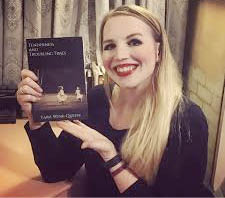
“We have a lot of books in our house. They are our primary decorative motif-books in piles and on the coffee table, framed book covers, books sorted into stacks on every available surface, and of course books on shelves along most walls. Besides the visible books, there are books waiting in the wings, the basement books, the garage books, the storage locker books…They function as furniture, they prop up sagging fixtures and disguised by quilts function as tables…I can’t imagine a home without an overflow of books. The point of books is to have way too many but to always feel you never have enough, or the right one at the right moment, but then sometimes to find you’d longed to fall asleep reading the Aspern Papers, and there it is.”
As writers we give to our readers. We give our words, emotions, stories. Do we take as well? Do we collect things from our readers other than royalties and reviews?
TW: In a way, yes. It reminds me of my response about “The Baby Losers Club.” I’d planned it as a novel, but the research that went into it (novel) was traumatizing for me. It’s an aspect…so important to have child loss, infertility represented. So many women experience this and it’s not spoken about in a normalized way.
Tara Wine-Queen, author of Tenderness and Troubling Times, English teacher, and collector of books and readers’ hurts can be found on her website: https://www.tarawinequeen.com. She enjoys reading the works of Ursula K. Le Guin, Jorge Luis Borges, Raymond Carver, and the collections of Diana Gabaldon and George R.R. Martin.
Leslie Sullivan

Leslie Sullivan (aka Anna McCluskey) made her debut into the world of short stories with her recently published collection A Pilsner Colored Ring of Light, a spontaneously published collection of five short stories that received positive reviews as stand-alone stories on her Patreon page.
In addition to holding down a collection of day jobs, Sullivan (McCluskey) describes herself as a humorous writer with a penchant toward emulating the works of Terry Pratchett. “His books are incredibly hilarious and insightful at the same time. I strive to show something about the world while making people laugh. I’m not just writing funny things to be funny, I want to instill a little bit of my worldview and my point of view on how the world should be, as well as how it is.”
Her other (yet to be published) collection The Bloody Unicorn and Other Delightfully Dark Drinks is a collection of stories, each accompanied by a cocktail recipe of the same name. There’s a story called “The Bloody Unicorn”, another called “The Eye-Gouger”, and one titled “The Machete.” Each were started with a cocktail recipe when she realized they needed an accompaniment. “My first thought was actually that between each drink I would tell hilarious tales from my days as a bartender, but I couldn’t think of very many! I have a gazillion stories from my barista career, and you’d think bartending would be funnier, because, you know, booze. Then I realized the macabre names of the drinks lent themselves really well to darkly humorous fantasy stories. So that’s what I did.”
Your books have some interesting titles. Who is your writing geared toward?
LS: My work is definitely geared toward adults. I don’t do well with writing without cursing.
How would you describe your collection(s), using only three words?
LS: Silly, dark, surprising
Have you always enjoyed reading short stories? What prompted your interest/love for them?
LS: I have always enjoyed reading short stories in isolation. Oddly (considering how much I enjoy writing them), I don’t enjoy reading whole books of short stories. When I’ve read anthologies in the past, I’ve had to read them one or two a day, and have another book as my main read.
As Writers we give to our readers. We give our words, emotions, stories. Do we take as well? Do we collect things from our readers other than royalties and reviews?
LS: Yeah, for sure. I feel like the humor involved in my writing is very much a personal thing. There’s always stuff that one person finds funny and someone else doesn’t. Whenever someone says they enjoy my work, I feel like I’ve found my people. Like my kind of weirdos, such as it were. The people who ask ‘why?’ aren’t my people, but others, who love it, I get that spark of joy from having found a kindred spirit…one of my people.
Author, poet, and speculative humorist, Leslie Sullivan (aka Anna McCluskey) believes short fiction is a “niche market” and that a lot of readers enjoy and many others aren’t even aware it exists. She hopes she can do her part to increase awareness to the masses so that they’ll buy her books and because she honestly thinks it [short fiction] will enrich their lives. You can connect with her at TheAnnaFiles or join her Patreon team and become a true “annaphile.”
Divya Adu
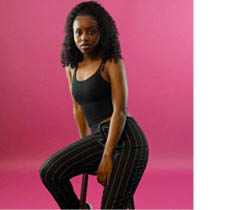
Divya Adu (pronounced DIV-YA AH-DO) never throws away a photo. Ever. It doesn’t matter if it’s a photo of an ex-boyfriend or the “moment” has ended, she keeps those gems tucked away as part of her life collection because, as she put it, “I enjoyed that moment at one time.” Perhaps that’s part of what makes this 20 year old New Yorker a bit of an old soul.
Author of You Are Enough, Said Me and room 317. I had the pleasure of speaking with Divya about her short story collections and life as a writer.
Why the indie route instead of traditional publication?
DA: When I was sixteen I decided I wanted to write a book. I had so many stories, journals, and poems, I felt that I needed to do something.
And “do something” she did. After publishing on Wattpad and getting good responses from her fans, Divya completed her own research and saw the length of time it typically takes to go the traditional publishing route. Declaring herself “impatient” she decided to do her own research and get her books in the hands of readers at her own pace.
As writers we give to our readers. We give our words, emotions, stories. Do we take as well? Do we collect things from our readers other than royalties and reviews?
DA: I think, for me personally, I write as a catharsis. It’s like my therapy–my version of going to therapy without going. While I don’t really expect to get something back from my readers, I’ve had some tell me that I’ve told their story in the process. I take pleasure in knowing I’m able to be a voice for those who can’t tell their stories. I like being able to do that for readers.
Describe one of your collections using only three words.
DA: “You Are Enough” … Said me: vulnerable, raw, delicate.
Have you always enjoyed reading short stories? What prompted your interest/love for them?
DA: I started off with short stories. I’ve been writing poetry since I was six years old. My mom used to buy me journals and I wrote every day, which later turned me on to writing short stories and poetry.
Tell us a little bit about the theme(s) of your collection(s) and their origins.
DA: “You Are Enough” … Said me: This collection contains stories about my childhood in Philadelphia, Pennsylvania. I grew up in the inner city and was raised by my parents and babysitters. I wrote this collection as a coming of age piece–what I saw, heard, experienced, dreamed of, and the women in my family. I had to figure out how to be a woman on my own because the women in my family worked so much they didn’t have time to talk to me about boys and sex and other womanly things. After awhile, I started to see myself as better than those women and in my book I talk about coming to the realization that I’m no different from the women in my family. That whatever they didn’t teach me wasn’t because they didn’t want to but because they had no one to teach them. The book helped me heal and helped me realize I am enough. I no longer had to look for my mom or cousins or aunts to tell me I’m enough.
I no longer need that validation.
Room 317.: This collection has stories written in essay form. It’s about dependency and how it feels to depend on someone else. How we often rely on others because of a lack of self-esteem. There are essays on love, intimacy, and family coupled with poems.
You can connect with Divya on Instagram @iamdivyaadu.To purchase her poetry inspired merchandise, check out her website: https://divyaadu.bigcartel.com.
Remi Carrington
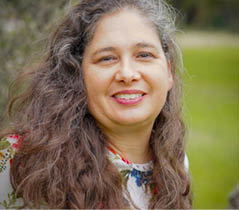
Remi Carrington, author of the Bluebonnets & Billionaire series has made a name for herself in the romance genre and in November 2020, she plans to make her debut in short stories. After having a short story accepted in an (upcoming) anthology, she worked with a group of sweet romance authors to put together a Christmas anthology. It was these two experiences that have prompted her to create her own collection.
Carrington: “With the busy season, it seems like a great time for short stories.”
For a novelist, Carrington explained she enjoys writing short stories but is often involved in producing longer works. Not a bad thing considering all the stories in her forthcoming collection will focus on the Christmas season and include minor characters from the Bluebonnets & Billionaires series.
Do you think short stories are on the rise?
RC: I think they might be. For busy people, reading short stories is a way to read a full piece without investing too much time. Sometimes it’s not about lack of time but the clutter in our heads. A friend of mine had trouble reading long pieces of fiction following the death of her mother. It was a side effect of grief. Eventually she was able to focus on longer fiction but during that time she read short stories.
Describe your collection in three words.
RC: Satisfying, memorable, connected.
You can learn more about Remi Carrington, her series, and upcoming collection by visiting her website: https://remicarrington.com/christmas-anthology
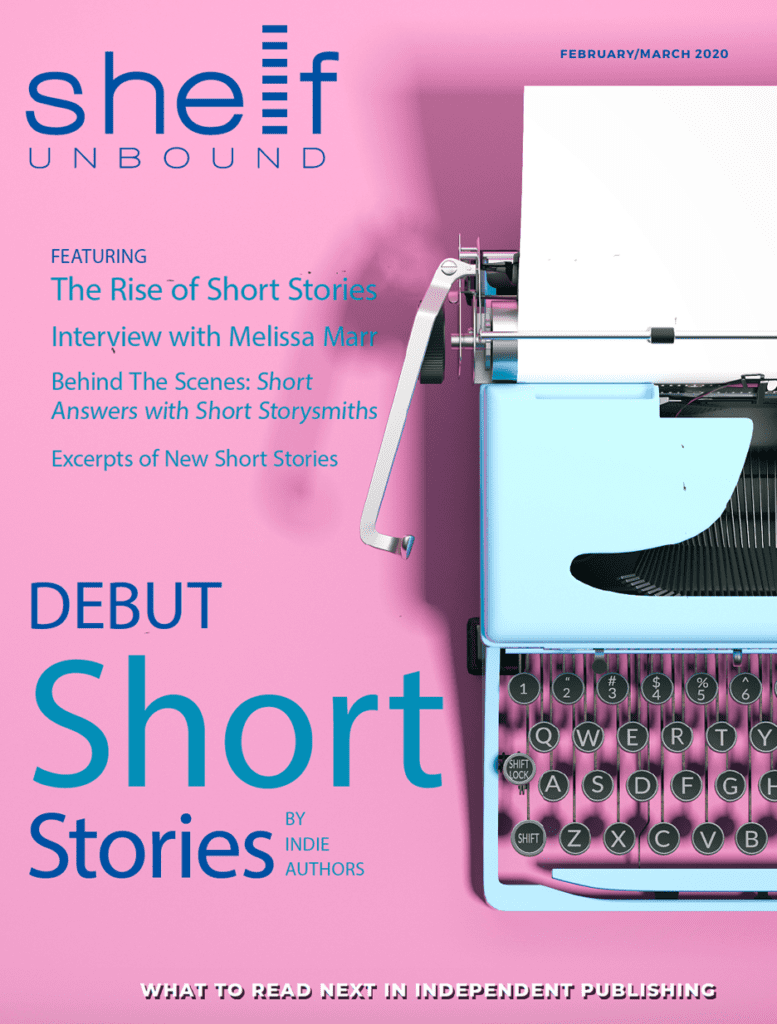
Continue Reading…
Article originally Published in the February/March 2020 Issue “Short Stories”
